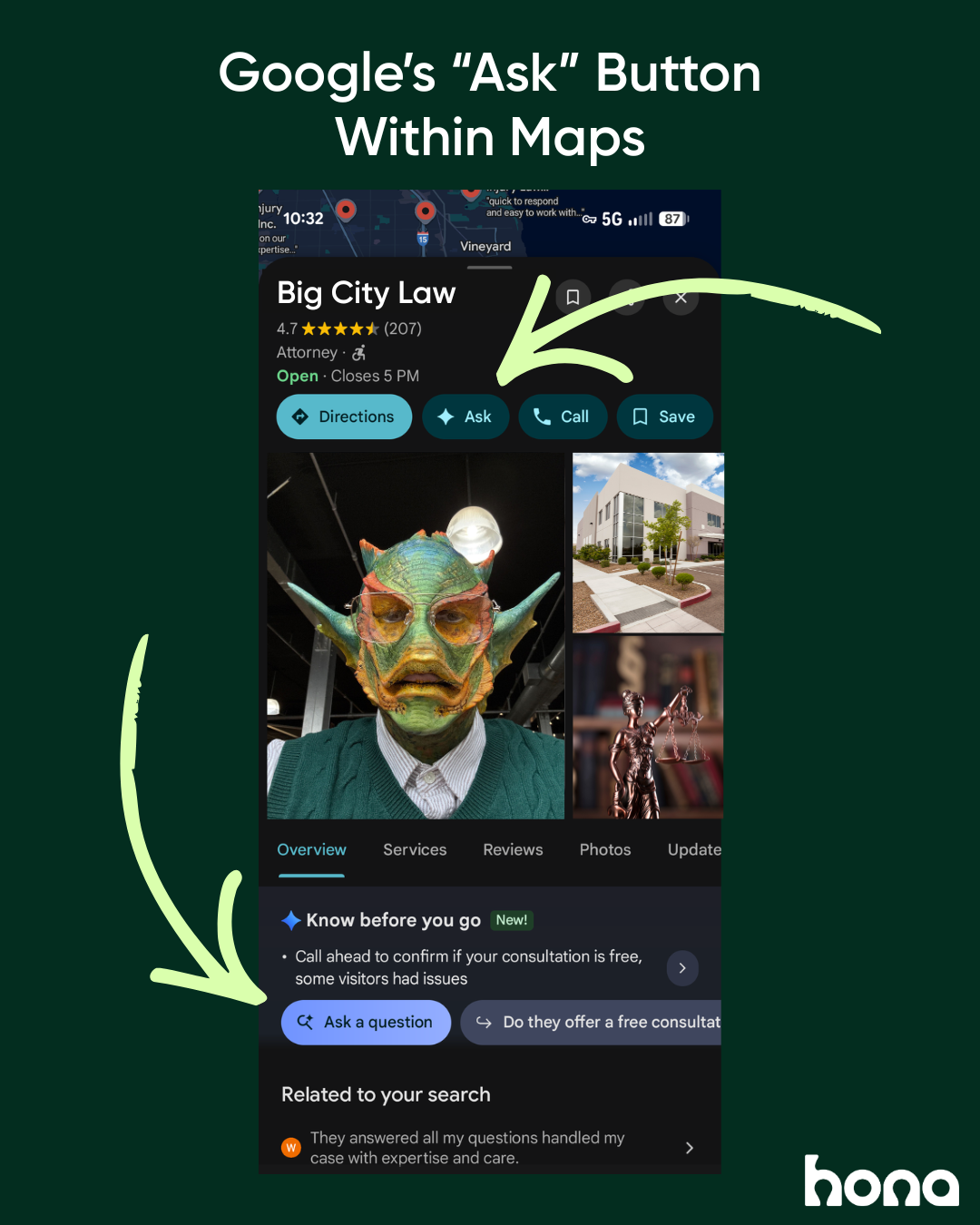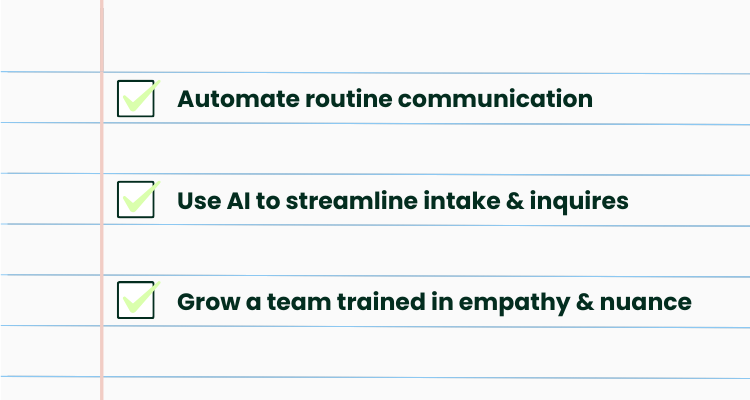
Don't Let Google Maps' AI-Powered Ask Button Give Wrong Information About Your Law Firm
Google now shows the new AI-powered “Ask” button in Maps and on Business Profiles. Don't let it give the wrong answers about your law firm.
The Hona Blog
Explore the Latest Trends, Tips, and Strategies in Legal Tech and Client Communication


Google now shows the new AI-powered “Ask” button in Maps and on Business Profiles. Don't let it give the wrong answers about your law firm.
While Google still shows the Q&A functionality on the backend in your Google Business Profile, it no longer appears for people looking your profile or searching for businesses like yours. Google now shows the new “Ask” button in Maps and on Business Profiles.
According to Google’s product team, “Customers can ask their question directly in Google Maps and get an updated, instant answer based on your answers and relevant reviews.” This Gemini-powered feature has been prioritized in December 2025 and it became more prominent during the summer of 2025.
Google pulls information from:
You can still answer questions about your law firm in your Business Profile. Just know this section is no longer visible to searchers.
According to Google: “Business Profile users can continue to answer existing questions about their business in the Q&A section in their Google Business Profile. Your published questions and answers will continue to power Google’s understanding of the real world and may be shown in Maps.”


Check and update these areas in your Business Profile and on your website to give Google’s AI all of the right information.
Make sure this information in your profile is up-to-date:
Inaccurate information in your profile will mean that Gemini and “Ask Maps” can’t answer correctly.
All of the information on your Business Profile must be the same on your website. Don’t provide Google with conflicting information. In particular, make sure the business name listed on Google is the same one found on your website.
Review your website’s accuracy and clearly label and update pages like:
Remember: AI is only providing the most likely answer to a question, not fact-checking, so you need to give it all the context. Your website is the best place to provide in-depth context about your law firm.
If you maintain a profile on any other review sites, like Yelp, or any directories of law firms, double check that all of your business information is accurate and updated.
Make sure that practice areas, business hours, contact information, staff information, etc. show up the same in every place someone might be searching.
Requesting more reviews! Google pulls information directly from reviews to populate answers in Maps. Legal marketing experts in particular note that Google seems to prioritize the user-generated answers that reviews already provide.
Here’s an example of the impact your reviews have on the answers given by Google’s AI via “Ask Maps.”
Rebecca was in a car accident. A few years ago she had to hire a personal injury lawyer for a slip-and-fall incident. But she remembers that the lawyer she hired then rarely contacted her. She felt isolated and confused, even though the case turned out in her favor. The communication was so bad she never referred that lawyer to anyone and mentioned it in her review.
In searching Google for other personal injury attorneys in her area, Rebecca comes across your firm. She wants to know upfront if your firm has a history of poor communication with clients. She uses the AI-powered “Ask” button to ask about your communication style.
If your firm has hundreds of positive reviews and many former clients mention how great your firm is at staying connected, Google is going to use that information to provide Rebecca’s answer.
So if you don’t have a solid process for requesting reviews, now’s the time to start.
Within its client portal and communication tools, Hona provides automated review requests. Set up these requests to send automatically via text message and the client portal at specific points in your case workflow.
Don’t miss out on valuable content that can revolutionize your law firm.

Google now shows the new AI-powered “Ask” button in Maps and on Business Profiles. Don't let it give the wrong answers about your law firm.
While Google still shows the Q&A functionality on the backend in your Google Business Profile, it no longer appears for people looking your profile or searching for businesses like yours. Google now shows the new “Ask” button in Maps and on Business Profiles.
According to Google’s product team, “Customers can ask their question directly in Google Maps and get an updated, instant answer based on your answers and relevant reviews.” This Gemini-powered feature has been prioritized in December 2025 and it became more prominent during the summer of 2025.
Google pulls information from:
You can still answer questions about your law firm in your Business Profile. Just know this section is no longer visible to searchers.
According to Google: “Business Profile users can continue to answer existing questions about their business in the Q&A section in their Google Business Profile. Your published questions and answers will continue to power Google’s understanding of the real world and may be shown in Maps.”


Check and update these areas in your Business Profile and on your website to give Google’s AI all of the right information.
Make sure this information in your profile is up-to-date:
Inaccurate information in your profile will mean that Gemini and “Ask Maps” can’t answer correctly.
All of the information on your Business Profile must be the same on your website. Don’t provide Google with conflicting information. In particular, make sure the business name listed on Google is the same one found on your website.
Review your website’s accuracy and clearly label and update pages like:
Remember: AI is only providing the most likely answer to a question, not fact-checking, so you need to give it all the context. Your website is the best place to provide in-depth context about your law firm.
If you maintain a profile on any other review sites, like Yelp, or any directories of law firms, double check that all of your business information is accurate and updated.
Make sure that practice areas, business hours, contact information, staff information, etc. show up the same in every place someone might be searching.
Requesting more reviews! Google pulls information directly from reviews to populate answers in Maps. Legal marketing experts in particular note that Google seems to prioritize the user-generated answers that reviews already provide.
Here’s an example of the impact your reviews have on the answers given by Google’s AI via “Ask Maps.”
Rebecca was in a car accident. A few years ago she had to hire a personal injury lawyer for a slip-and-fall incident. But she remembers that the lawyer she hired then rarely contacted her. She felt isolated and confused, even though the case turned out in her favor. The communication was so bad she never referred that lawyer to anyone and mentioned it in her review.
In searching Google for other personal injury attorneys in her area, Rebecca comes across your firm. She wants to know upfront if your firm has a history of poor communication with clients. She uses the AI-powered “Ask” button to ask about your communication style.
If your firm has hundreds of positive reviews and many former clients mention how great your firm is at staying connected, Google is going to use that information to provide Rebecca’s answer.
So if you don’t have a solid process for requesting reviews, now’s the time to start.
Within its client portal and communication tools, Hona provides automated review requests. Set up these requests to send automatically via text message and the client portal at specific points in your case workflow.

Is Hona really that effective for client communication and managing case updates? Ask the law firms using it every day. All of these stats come self-reported.
Is Hona really that effective for client communication and managing case updates? Don't ask me. Ask the law firms using it every day.
All of these stats come self-reported, straight from attorneys and their teams that use Hona on an everyday basis. Their practice areas include personal injury law, disability law, and family law.
With Hona, law firms eliminate manual communication tasks, provide consistent case updates, and educate clients about the legal process. All in a portal that clients access anytime.

With 1,000+ active cases, Impact Disability Law saw repetitive client communication slowing down other tasks. But Impact no longer spends 1 hour on pre-hearing calls. Here's how.
With nearly 1,000 active cases and growing, Impact Disability Law's attorney and staff saw client communication starting to slow things down. Repetitive tasks like updates, pre-hearing calls, and document follow-ups ate into time that should’ve gone toward case prep.
The Impact team needed a way to get all updates and calls done without sacrificing the client experience or the process of building strong cases.
The Impact team integrated their CMS with Hona, letting Hona take over:
They now keep clients informed and prepared every step of the way — without spending hours on repetitive client communication.
While before communication happened manually and without a system, implementing Hona gave the Impact team peace of mind that every client got the right updates at the right time.
“[Hona] really helps us direct communication. It’s just automatically going and that’s less manual work, less things to worry about.”
– Julie Farrar, Director of Operations at Impact Disability Law
Instead of doubling staff to fill in the gaps, the Smallow team scaled more efficiently with Hona in their tech stack. By eliminating the most time consuming day-to-day communication issues, relationship managers have been able to handle 3 times more cases than before.
With Hona in place, Impact Disability Law has seen:
By relying on Hona to automatically send the reminders and updates that keep clients in the loop, Impact Disability Law provides a better client experience and takes on more cases.
75% shorter pre-hearing calls (15 minutes vs. 60 minutes) because videos and updates in the Hona portal answer client questions ahead of time
1,500 hours saved by the team as a whole
68% increase in case volume in less than 1 year of using Hona

When you’ve got high call volume, you might need 10 relationship managers. With Hona, you only need 3. Adam Smallow Injury Lawyers reduced client calls and grew case volume 3x.
At Adam Smallow Injury Lawyers, case volume grew and grew. A great thing! But so did the calls. The relationship managers of the firm constantly felt tied up on the phone, slowing down operations.
The Smallow team needed a way to continue taking on cases without sacrificing responsiveness, client care, or firm efficiency.
Since 2023, the Smallow team has used Hona to:
By prioritizing proactive communication, the Smallow team prevents clients from feeling lost or confused about the status of their case. Relationship managers focus on complex issues related to cases. Routine communication runs in the background instead.
Every client ultimately receives more attention and care, even though the firm handles way more cases overall.
“When you’ve got high call volume, you might need 10 relationship managers. With Hona, you only need 3.”
– Adam Smallow, Owner & Founding Attorney of Adam Smallow Injury Lawyers
Instead of doubling staff to fill in the gaps, the Smallow team scaled more efficiently with Hona in their tech stack. By eliminating the most time consuming day-to-day communication issues, relationship managers have been able to handle 3 times more cases than before.
With Hona in place, Adam Smallow Injury Lawyers has seen:
3x case load capacity by replacing daily client calls with automated texts and other updates
$171,000 saved annually by reducing the need for additional staff
149% increase in case volume since implementing Hona in 2023
.png)
Winning cases isn’t enough. This guide shows law firms how to blend AI, automation, and empathy to keep clients loyal and referrals rolling in.
Today, law firms are investing in AI and automation to scale more efficiently. But the ones building long-term loyalty? They’re focused on communication.
Because at the end of the day, clients don’t just remember what you did, they remember how you made them feel.
Retention isn’t about results alone. How you guide and inform clients along the way plays a key role in client retention and referrals.
These aren’t small misses.
When communication breaks down, clients lose confidence. No matter the outcome of the case, if a client feels left in the dark, they’ll walk away feeling uncared for. And with that, retention and referrals disappear too.
The client experience starts long before a case is opened, it begins at intake. And too often, that first impression gets lost to missed calls, long wait times, or clunky forms.
This is where AI can make a real difference for your firm.
Tools like Voice AI can greet every caller immediately, capture key information, and route urgent matters to the right person on your team. That means no voicemail black holes, no frustrating delays, just a fast, helpful response from the start.
It’s a small shift, but it can dramatically improve how potential clients feel about your firm from the first interaction.
But here’s the key: AI is a support tool, not a replacement. The human touch and empathy remains essential for client trust.
If you want to improve your intake process using AI and increase Google Reviews, check out part 1 from Matador Solutions (experts in legal digital marketing).
Clients shouldn’t have to guess what’s going on. That’s where automation and tools like Hona’s client portal can help. When customized well, client portals become communication hubs that help clients feel informed and cared for:
.png)
Small, thoughtful gestures go a long way in a profession where communication often feels transactional.The goal is to make automation feel warm and human, not robotic. This builds client trust and keeps them engaged.
There are moments in every client relationship where tone and empathy matter more than speed.
Delays. Sensitive updates. Gray areas. These are not moments to let automation take over. Even a short call or personal note can reinforce trust and show clients that someone’s paying attention. With the every day communications taken care of, your team can spend more time providing personalized support.
But tech alone won’t cut it. Your team still needs the tools, training, and clarity to communicate with consistency and care.
When you combine smart systems with a team that knows how to show up, that’s when you start building real client loyalty.
You don’t need a major overhaul to improve retention. The most effective firms use simple systems that:

This approach reduces client uncertainty, saves your team time, and ensures nothing important slips through the cracks.
.png)
How do you grow referrals in family law? Bundy Law started by making the client experience smoother, faster, and more personal, with help from Hona.
In family law, legal strategy is only half the job. The other half? Helping clients feel supported during some of the most emotionally intense moments of their lives.
Aaron Bundy knows that. And he’s built Bundy Law around a simple principle: the client experience is everything. They shouldn’t have to chase updates, dig through emails, or feel confused about what’s next. They should know where they stand—every step of the way.
“If my dentist can text me appointment reminders, why shouldn’t we offer the same level of service to clients going through divorce or custody battles?”
That mindset led him to Hona. Automating parts of the client experience has made a measurable impact on the way Bundy Law runs.
Bundy’s always improving, especially when it comes to how clients experience the firm.
Before Hona, communication worked, but it was manual. Repetitive. Time-consuming.
Now, it’s easier for clients and more efficient for staff. Nothing gets missed and (more importantly) nothing feels robotic.
And the experience looks like this:
“An informed client has a way better experience. That’s not just a nice-to-have, it’s essential in family law.”
Bundy didn’t set out to reduce calls. But with clients now getting the information they need up front, the number of inbound calls dropped, without compromising client satisfaction.
“Hona’s really reduced our call volume, but that’s not really why we started using it. For us, it’s always been about improving the client experience.”
This automated communication allows Bundy Law to answer client questions before they even ask.
It also means fewer interruptions for staff. More prepared conversations. And time back to focus on actual casework.
Clients don’t have to guess. They don’t feel in the dark. And when they need to sign something, it’s a tap away.
Since rolling out Hona, Bundy Law has seen steady, repeatable improvements across the board:
“We’ve had cases that didn’t go our way, but clients stayed loyal because they knew what was happening the whole way through.”
Bundy Law isn’t using Hona just to automate tasks. They’re using it to deliver an experience that clients remember, and recommend.
%2520(800%2520x%2520218%2520px).png)
“Hona is 10/10. Five stars. And that’s what we’re trying to give our clients.”
Curious how other firms are doing it? Explore more case studies like The Jeffcoat Firm and see what’s possible with Hona.